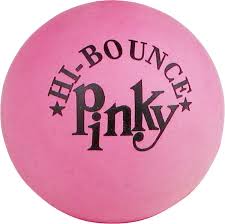
Yes, that pink colored rubber ball that many of us had as children. Ok maybe for some of you it is a toy your folks used, but still just refer to the photo. So I actual use this simple device when trying to learn lines, especially Shakespeare. But it helps with all lines from any genre. it can also be used for lyrics.
Now work with me here. When learning lines, I simply bounce the ball along with saying the lines aloud. This works great for Shakespearean verse since it is written in specific beats. a typical line of verse has 5 soft and 5 hard beats, alternating...da-DUM-da-DUM-da-DUM-da-DUM-da-DUM. That is a typical line, so I may bounce the ball down on the hard beats.
But this works for any lines. It has to do with distracting your mind, and slipping your lines into your brain in a structured way. It really helps if you have a word that is hard or that you have trouble remembering. Then I FIERCELY bounce the ball while calling out the word several times. By over emphasizing, exaggerating, and making a strong memory path, the word gets into your brain more dynamically, and that helps you with recall.
If I am working on a scene with a partner, we bounce the ball to each other after each one is done with a line. If I am getting help from someone reading, I may just bounce it on the floor after my line, listening to the next cue.
I find it also helps if I am walking or pacing as I bounce the pinky, again, saying the lines aloud. You may recall an earlier blog about memorization, using an MP3 or the like, and that method is still great. But I alternate it with Pinky work, as it is a bit more physical, and fun. :)
(Oh and in a total nerd rush, I use a different ball for each show, and write the show on character on it. Then after, give it away. )
J.T. Turner
The Actors Sensei






